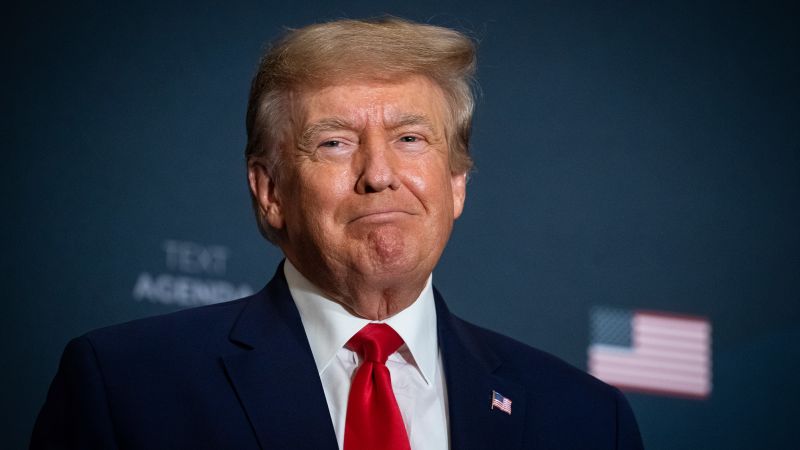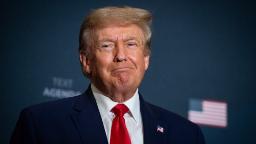

CNN
—
Just days before Donald Trump hosts his first 2024 event in South Carolina, a state whose evangelical population has long played a critical role in its presidential primary, the former president is lashing out at religious conservatives who have declined to endorse his third presidential campaign.
Trump’s comments to conservative journalist David Brody in a podcast interview Monday, in which he decried the “disloyalty” of evangelical leaders who have withheld public support for his campaign, were the latest in a series of bewildering remarks he’s made about one of the most critical voting blocs in a Republican primary.
“Nobody has ever done more for Right to Life than Donald Trump. I put three Supreme Court justices, who all voted, and they got something that they’ve been fighting for 64 years, for many, many years,’” Trump told Brody, referring to the Supreme Court’s overturning of federal abortion rights in Dobbs v. Jackson Women’s Health Organization decision last summer.
“There’s great disloyalty in the world of politics and that’s a sign of disloyalty,” Trump continued, bemoaning evangelical leaders who have declined to support his latest campaign.
Earlier this month, Trump also criticized abortion opponents for losing “large numbers of voters” in the 2022 midterm elections, “especially those that firmly insisted on No Exceptions, even in the case of Rape, Incest, or Life of the Mother.” The comments on his Truth Social platform drew sharp retorts from several prominent religious conservatives and anti-abortion activists, including Susan B. Anthony Pro-Life America president Marjorie Dannenfelser, who, in a thinly veiled critique of Trump, criticized Republicans who have advocated for an “Ostrich Strategy” on abortion, preferring to ignore the issue than elevate it in critical elections.
Trump reaffirmed this sentiment in his interview with Brody, admitting that he advised 2022 GOP gubernatorial candidates Doug Mastriano of Pennsylvania and Tudor Dixon of Michigan that they would face a tougher path to victory for refusing to support exceptions for abortion restrictions, such as when the life of the mother is at risk. Both candidates eventually lost their respective races. As CNN has previously reported, Trump spent much of the midterm cycle privately griping to aides and allies that the overturning of Roe v. Wade damaged Republicans by elevating the issue and drawing attention away from more favorable topics such as inflation and crime.
Trump’s recent complaints about evangelicals and abortion opponents have baffled allies and advisers who recognize the crucial role both groups play in the conservative ecosystem and their sway in presidential primaries – a dynamic the former president is seemingly well aware of. In 2016, Trump’s chief reason for tapping Mike Pence, the self-described “devout evangelical” and then-Indiana governor, to be his running mate was to shore up support among religious conservatives who remained deeply skeptical of his own brash political brand. That same mission could prove more challenging in a crowded 2024 primary as Trump works to convince primary voters he is both the most electable and most committed to advancing their causes in a second administration.
“There’s no path to the nomination without winning the evangelical vote. Nobody knows that better than President Trump because, to the surprise of almost everyone, he won their support in 2016,” said Ralph Reed, executive director of the Faith & Freedom Coalition, who has long been close to the former president.
“He’s going to get a very fair hearing from voters of faith. But this will be a contested primary with a lot of pro-life candidates and all of them will get to make their case,” Reed added. “No one should assume the evangelical vote is spoken for or foreclosed to them.”
Some prominent evangelical leaders have already begun publicly distancing themselves from Trump, worried that he won’t be as electable as other Republicans against President Joe Biden.
“It’s time to turn the page. America must move on. Walk off the stage with class,” tweeted Bob Vander Plaats, president and CEO of the Family Leader.
In a November op-ed titled, “It’s time for the GOP to say it: Donald Trump is hurting us, not helping us,” Dr. Everett Piper, the former president of a Christian university, wrote that Trump “hindered rather than helped the much-anticipated ‘red wave’” in the 2022 midterms.
Trump has not only contributed to waning support for Republicans among key demographics like suburban women, his own support among White evangelicals and White Catholic voters – two demographics he carried in 2016 – was already softening during his 2020 campaign, long before he began insulting evangelical leaders for their “disloyalty.” CNN exit polls from Trump’s 2020 race against Biden show that he garnered 56% of support among White Catholic voters nationwide, down 4 points since 2016, and also dipped 4 points to 76% among White evangelical voters.
One evangelical leader, who requested anonymity to speak freely, brushed off the importance of public support from religious leaders and said Trump’s fate will be determined by church-goers and voters themselves.
“Evangelicals in the pews moved toward Trump quicker than evangelical leaders. It was not the leaders leading the laity,” this person told CNN, while noting that conservative Christians in their own community were split over whether to support Trump in 2024 – with many looking for a new candidate to carry the former president’s agenda forward.
Some advisers to the former president insist they aren’t worried about the repercussions of his recent comments. Trump remains in regular contact with high-profile evangelical leaders. Advisers argue the results that Trump delivered for religious conservatives – from advancing anti-abortion policies and appointing hundreds of conservative federal judges to relocating the US embassy to Jerusalem – will provide a clear contrast once the 2024 GOP field takes shape and opponents begin swiping at Trump’s conservative bona fides.
“President Trump’s unmatched record speaks for itself – nominating pro-life federal judges and Supreme Court justices that overturned Roe v. Wade, ending tax-payer funded abortions, reinstating the Mexico City Policy that protects the life of the unborn abroad, and many other actions that championed the life of the unborn. There has been no bigger advocate for the movement than President Trump,” said Trump campaign spokesman Steven Cheung in a statement to CNN.
Others close to Trump have speculated that his decision to blame abortion opponents for a poor performance by Republicans in 2022 has more to do with his own unwillingness to recognize the negative impact he had on the midterm elections.
“Evangelicals put Trump in the White House and justified it by saying he would appoint conservative judges,” one former adviser told CNN. “Now he’s backing away from his one unassailable win for them and trashing them in the process. It’s self-defeating.”
In the coming months, the former president will continue to highlight the first-term accomplishments that endeared him to religious conservatives, said a person familiar with the matter. He will also maintain his outreach to prominent figures within the religious right, some of whom are eagerly waiting to see which other Republicans dive into the 2024 primary. As Trump works to court religious conservatives, his early announcement may put him at a disadvantage to some of his potential rivals. A federal law that prohibits churches from engaging in political campaigns could block Trump from speaking directly to evangelicals at megachurches across the country, something former Vice President Mike Pence has been doing as part of his recent book tour.
It is unclear if Trump will take part in the annual March for Life in Washington later this week, when one of his potential primary opponents – Pence – is planning to host participants at the nearby office of his policy group, Advancing American Freedom. Cheung would not comment on the former president’s plans.
Still, Trump’s past accomplishments might not carry the same weight in a primary that his campaign is hoping for. In the days after he announced his campaign from the ballroom at Mar-a-Lago, an event that few of his most prominent evangelical allies attended, the former president was urged by Dannenfelser to deliver “a strong pro-life national vision” if he and others want to be competitive in the primary. Trump had not mentioned any of his accomplishments in the anti-abortion sphere during his campaign announcement speech, something Dannenfelser and others took notice of.
His reluctance so far to back calls for a national abortion ban from conservative groups and anti-abortion activists could also become problematic in a primary against Pence or others who have supported such efforts.
“I welcome any and all efforts to advance the cause of life in state capitals or in the nation’s capital,” Pence said last September when asked about a bill proposed by South Carolina Sen. Lindsey Graham that would enact federal abortion restrictions.
